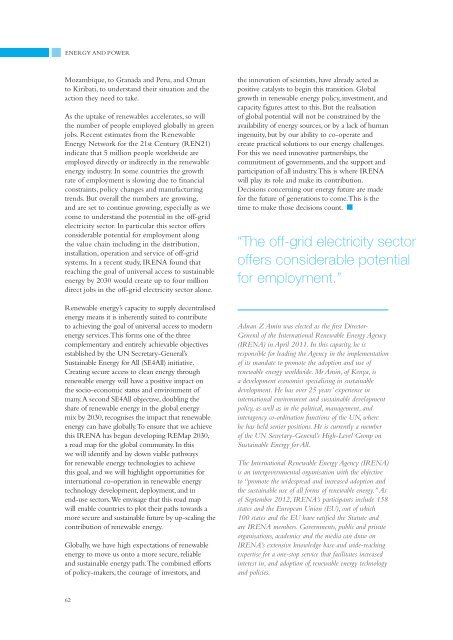Climate Action 2012-2013
Create successful ePaper yourself
Turn your PDF publications into a flip-book with our unique Google optimized e-Paper software.
ENERGY AND POWER<br />
Mozambique, to Granada and Peru, and Oman<br />
to Kiribati, to understand their situation and the<br />
action they need to take.<br />
As the uptake of renewables accelerates, so will<br />
the number of people employed globally in green<br />
jobs. Recent estimates from the Renewable<br />
Energy Network for the 21st Century (REN21)<br />
indicate that 5 million people worldwide are<br />
employed directly or indirectly in the renewable<br />
energy industry. In some countries the growth<br />
rate of employment is slowing due to financial<br />
constraints, policy changes and manufacturing<br />
trends. But overall the numbers are growing,<br />
and are set to continue growing, especially as we<br />
come to understand the potential in the off-grid<br />
electricity sector. In particular this sector offers<br />
considerable potential for employment along<br />
the value chain including in the distribution,<br />
installation, operation and service of off-grid<br />
systems. In a recent study, IRENA found that<br />
reaching the goal of universal access to sustainable<br />
energy by 2030 would create up to four million<br />
direct jobs in the off-grid electricity sector alone.<br />
Renewable energy’s capacity to supply decentralised<br />
energy means it is inherently suited to contribute<br />
to achieving the goal of universal access to modern<br />
energy services. This forms one of the three<br />
complementary and entirely achievable objectives<br />
established by the UN Secretary-General’s<br />
Sustainable Energy for All (SE4All) initiative.<br />
Creating secure access to clean energy through<br />
renewable energy will have a positive impact on<br />
the socio-economic status and environment of<br />
many. A second SE4All objective, doubling the<br />
share of renewable energy in the global energy<br />
mix by 2030, recognises the impact that renewable<br />
energy can have globally. To ensure that we achieve<br />
this IRENA has begun developing REMap 2030,<br />
a road map for the global community. In this<br />
we will identify and lay down viable pathways<br />
for renewable energy technologies to achieve<br />
this goal, and we will highlight opportunities for<br />
international co-operation in renewable energy<br />
technology development, deployment, and in<br />
end-use sectors. We envisage that this road map<br />
will enable countries to plot their paths towards a<br />
more secure and sustainable future by up-scaling the<br />
contribution of renewable energy.<br />
Globally, we have high expectations of renewable<br />
energy to move us onto a more secure, reliable<br />
and sustainable energy path. The combined efforts<br />
of policy-makers, the courage of investors, and<br />
the innovation of scientists, have already acted as<br />
positive catalysts to begin this transition. Global<br />
growth in renewable energy policy, investment, and<br />
capacity figures attest to this. But the realisation<br />
of global potential will not be constrained by the<br />
availability of energy sources, or by a lack of human<br />
ingenuity, but by our ability to co-operate and<br />
create practical solutions to our energy challenges.<br />
For this we need innovative partnerships, the<br />
commitment of governments, and the support and<br />
participation of all industry. This is where IRENA<br />
will play its role and make its contribution.<br />
Decisions concerning our energy future are made<br />
for the future of generations to come. This is the<br />
time to make those decisions count. <br />
“The off-grid electricity sector<br />
offers considerable potential<br />
for employment.”<br />
Adnan Z Amin was elected as the first Director-<br />
General of the International Renewable Energy Agency<br />
(IRENA) in April 2011. In this capacity, he is<br />
responsible for leading the Agency in the implementation<br />
of its mandate to promote the adoption and use of<br />
renewable energy worldwide. Mr Amin, of Kenya, is<br />
a development economist specialising in sustainable<br />
development. He has over 25 years’ experience in<br />
international environment and sustainable development<br />
policy, as well as in the political, management, and<br />
interagency co-ordination functions of the UN, where<br />
he has held senior positions. He is currently a member<br />
of the UN Secretary-General’s High-Level Group on<br />
Sustainable Energy for All.<br />
The International Renewable Energy Agency (IRENA)<br />
is an intergovernmental organisation with the objective<br />
to “promote the widespread and increased adoption and<br />
the sustainable use of all forms of renewable energy.” As<br />
of September <strong>2012</strong>, IRENA’s participants include 158<br />
states and the European Union (EU), out of which<br />
100 states and the EU have ratified the Statute and<br />
are IRENA members. Governments, public and private<br />
organisations, academics and the media can draw on<br />
IRENA’s extensive knowledge base and wide-reaching<br />
expertise for a one-stop service that facilitates increased<br />
interest in, and adoption of, renewable energy technology<br />
and policies.<br />
62












